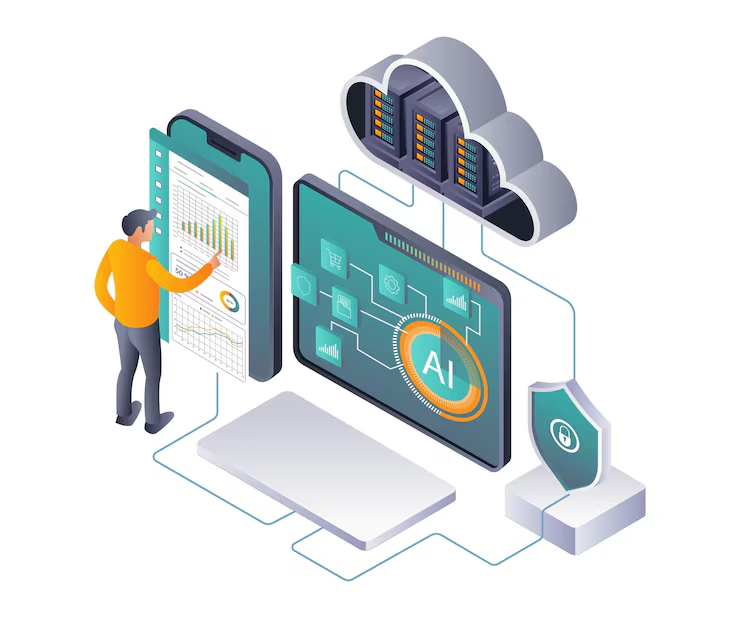In the current climate of intense competition in the industry, advanced data analytics is the backbone of critical decision making for organizations. The Internet of Things (IoT) has provided businesses with unique capabilities to collect, send, and analyze data in real time. Combining this ability with NetSuite Integration, one of the leading cloud-based ERP systems (Enterprise Resource Planning), not only provides ample opportunity to improve intelligent decision making, automate workflows, and streamline operations, but also powers synergetic growth for all cloud-based services. This article explores how actionable insights derived with NetSuite are changing the face of manufacturing, retail, and logistics industries.
Real-World Use Cases: IoT-Enabled Manufacturing and Smart Inventory Management
The influence of IoT technologies is already evident in manufacturing industries all over the world. Factories are transforming into ‘smart’ facilities that have incorporated sensors on equipment, machinery, and production lines. These sensors monitor variables such as temperature, vibration, machine performance, and production flow. Connecting this data stream to NetSuite enables companies to automate equipment maintenance, anticipate breakdowns, and precisely manage schedules.
As an example, a manufacturing company with IoT sensors on their assembly line can monitor changes in machine performance. In the case a machine would have encountered a problem, NetSuite would now have the capacity to accept the output as an input and automate work orders for preventive maintenance—and avoid costly downtime while ensuring production output to be smooth.
In terms of inventory management, smart shelves as well as RFID tags have transformed warehousing. The devices can track stock levels and relay this information to NetSuite’s inventory management module in real time. Consequently, companies now have real-time insight into the movement of stock, the need to reorder, and components being fulfilled. This minimizes overstocking or stockouts and greatly improves supply chain efficiency.
The Role of NetSuite’s SuiteAnalytics in Processing and Analyzing Real-Time Data
Real-time data capture is only one side of the equation. SuiteAnalytics helps in making informed decisions by interpreting the data captured by providing meaningful insights.
SuiteAnalytics also helps in business intelligence and reporting. This feature of NetSuite analyzes data from IoT devices and integrates it into intelligent dashboards, KPIs, saved searches, and custom reports. Even users without scientific training can derive valuable insights that are automatically visualized. These insights can be acted upon instantly. SuiteAnalytics processes a wide array of data and transforms it into custom reports and easy-to-understand attribute dashboards.
A logistics example can describe how GPS-enabled delivery vehicles capture location, speed, and route details which get sent to NetSuite. Advancements in SuiteAnalytics technology allow real-time data interpretation meaning SuiteAnalytics has the ability to depict current delays and identify efficient routes in real-time. Operations Managers can monitor delivery rerouting in real-time and modify schedules on-the-fly while identifying drives in need of extra support or training.
Also, AI-driven modern analytics optimize operational capabilities by examining past data with trend predictions. Knowing when: anticipating inventory with assurance for retail, knowing invasive raw material stock for pre-emptive manufacturing surge control – all translate to stunningly smarter business.
Benefits for Industries Like Logistics, Retail, and Manufacturing
The Internet of Things (IoT) combined with systems like NetSuite create new possibilities for almost any industry. While different sectors optimize this merger in different ways, all of them realize improvements in efficiency, transparency, responsiveness, and overall operational agility.
Logistics
In logistics, everything is about visibility. There are IoT devices like vehicle sensors, GPS trackers, and RFID-based package trackers that ensure every movement is recorded in real time. Logistics companies receive real-time updates about fleet and shipment location through the integration of NetSuite. This enables proactive customer notifications, reduced delivery times, and improved route optimization. Integration with ERP consolidates shipping, billing, and inventory data which reduces errors, helps improve service levels, and increases customer satisfaction.
Retail
IoT devices allow retailers to monitor foot traffic, shelf-level inventory, and even ambient conditions such as lighting, temperature, and humidity. This data can then be put onto NetSuite so managers can monitor demand forecasting, monitor product optimizations, and product shelf arrangement optimizations. Reinvented smart shelves could also alert when stock items fall below a certain level and even place reorders with NetSuite which would result in further sales optimization.
Creating Products
It is clear to see how manufacturers leverage IoT-enabled devices which transmit usage metrics and apparatus wellness. This allows predictive maintenance scheduling, operations halts, or breakdowns are not sudden and unplanned. Moreover, machine data can assist real-time supervisors to monitor production and further enable dynamic workload balancing. The integration with NetSuite makes certain that the generated data contributes automatically to projects schedule, materials supply, and staff requisition as all operations are interrelated and harmonized.
Best Integration Methods for IoT Devices with NetSuite, Including APIs and Middleware
Choosing the right integration architecture is crucial for the success of omnet integrating NetSuite and IoT devices. There are well-defined approaches to aligning physical devices with ERP systems, these include:
APIs (Application Programming Interfaces)
NetSuite’s IoT device (or its platform) integration with the various data modules is achieved through REST and SOAP APIs which allow real-time communication. As such, developers are able to build custom workflows that stream data from sensors and trigger actions in NetSuite. Activities that can be undertaken include work order creation, inventory level adjustments, and alert initiations based on exceeding threshold limits set by sensors.
Middleware and Integration Platforms
Firms having numerous devices integrated into one network or having more intricate system demands stand to benefit from middleware tools such as Dell Boomi, Celigo, or MuleSoft. These tools serve as an intermediary in the IoT ecosystem and NetSuite by doing data transformation, scheduling, and error handling. Building and maintaining myriad point-to-point integration can also be costly and time-consuming, which is avoided by employing middleware solutions.
IoT Platforms with NetSuite Connectors Certain IoT platforms offer wired connectors for NetSuite which require minimal configurational effort. These ‘plug-and-play’ solutions save a lot of implementation time and provide a smooth fit into the NetSuite standard fields and processes. They may not be as adaptable as tailored formed integrations, especially at the later stages, but serve as an excellent starting point for firms commencing their IoT voyage.
Regardless of the chosen approach, effective strategizing is imperative. This involves considering the data metrics such as structure, size, update rate, and level of security. There must be data management policies in place to effectively shield sensitive data and ensure other compliance obligations are fulfilled.
Conclusion: The Strategic Edge of Real-Time Integration
Integrating NetSuite with the Internet of Things is no longer a futuristic dream; it’s a requirement for organizations looking to be agile, productive, and competitive. Real-time data across the board, from optimizing operations at the factory to managing dynamic inventories and monitoring delivery fleets, is a game-changer. It allows teams to respond to situations in a timely manner, which cuts down on waste and improves the customer experience.
NetSuite’s native tools play an important role. SuiteAnalytics, for instance, makes sure that the data doesn’t just sit there accumulating but that it’s analyzed and insights are drawn. Businesses, when approached in the right way, with APIs, middleware, or pre-built connectors can achieve effortless growth along with ease in modification. At Ecobsoft, we know that the NetSuite Integrations with IoT Integration comes off as an intimidating prospect. But we also understand that it garners the attention it deserves because it is an astute investment. It merges your digital functions seamlessly with physical assets, making a responsive system that prepares for change. In the current context where everything runs on raw data, being responsive is what can set the difference between making it and bracing out.








